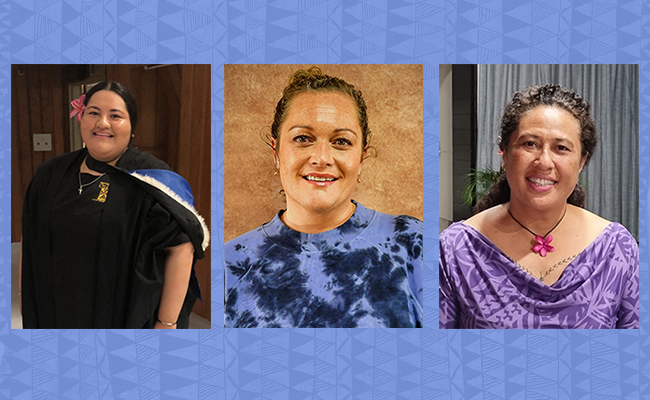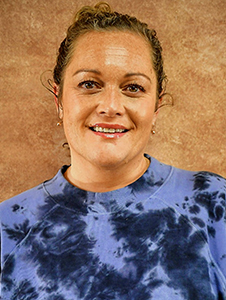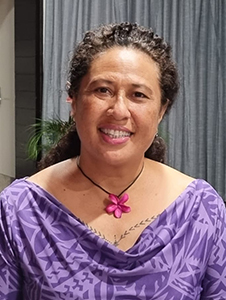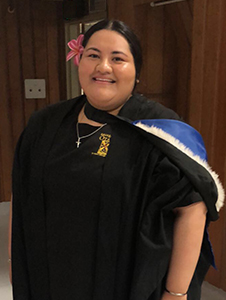
The Va'a o Tautai team celebrate three of their staff as they cross the graduation stage.
Jane Taafaki, Malama Tafuna'i and Grettel Williams have more than just their workplace in common.
The Va'a o Tautai (VoT)-based kaimahi will all be crossing the graduation stage together this Saturday.
While their journeys looked different, they share a responsibility to their communities, a passion for research and a desire to be good role-models for their daughters.
Jane Taafaki

Jane hopes her research helps empower Pasifika communities in their healthcare journey.
Jane Taafaki's doctoral thesis on Tuvaluan health and ola lei (wellbeing) was marked as one of Otago's exceptional Health Sciences theses this year.
Taafaki, who works at VoT as a Postdoctoral Fellow, wrote her doctorate on the lived experiences of Tuvaluan migrants navigating the healthcare system in Aotearoa, an area of public health research she says “deserves attention”.
She focused on the primary and tertiary care experiences of rurally-based communities with an aim of uncovering the systemic policies and practices that impact their health.
“Tuvaluans represent a small and relatively new Pasifika population in Aotearoa New Zealand and there is a lack of knowledge about their health and health experiences in their new home,” she says.
Taafaki wants to move away from the “one-size-fits-all” approach to healthcare and research, and says she instead wants to “create and be in a space in which Pasifika communities are empowered”.
She says her research methodologies were underpinned by the Pacific values of respect, reciprocity, humility, service and collective responsibility.
“Being able to have meaningful engagement with research participants in my community has been especially rewarding and is a testament to the benefits of co-design, Pacific research methodologies and qualitative research in general.”
Early in her research, she found that existing Pasifika health inequties were exacerbated for Pacific communities living in rural locations.
“I wanted to be a part of the solutions to the challenges they are facing,” Taafaki says.
“On a national scale, my wish is to revolutionise the provision of health care as a whole: embracing the differences that exist in our communities, promoting holistic approaches to health, prevention and management of illness, and embracing the power of Pasifika communities through partnership and innovation.”
Taafaki says she is humbled to have had her work marked as one of Otago's exceptional theses. Hers was one of seven Otago theses that achieved exceptional thesis status this year.
She was recently awarded a postdoctoral fellowship through Coastal People Southern Skies and Va'a o Tautai, which will allow her to remain teaching at Otago and will also enable her to do further research into the impact of the community-led COVID-19 immunisation programs in rural Otago.
She has partnered with the School of Physiotherapy to research the longterm health outcomes of Pacific meatworkers in rural Aotearoa, particularly relating to repetitive motion injuries. Taafaki is also contributing to ongoing research with the Department of General Practice and Rural Health.
Taafaki is grateful to the “best group of supervisors” who guided her through her PhD, and says her her family and community will always be her biggest “why”.
“I have three daughters and I want them to know that they can achieve anything they set their minds to, and to see Pasifika well and thriving in Aotearoa NZ is always going to be a motivator for me too.”
Malama Tafuna'i

As a practicing doctor returning to study, Malama was focused on her expertise translating back to actionable outcomes.
Senior Professional Practice Fellow Malama Tafuna'i transitioned from health practictioner in sunny Samoa to health PhD candidate in Dunedin to learn more about kidney disease.
Her research looked at the epidemiology of chronic kidney disease in Samoa and amongst Samoans living in Auckland to understand the burden of chronic kidney disease (CKD) on Samoan peoples.
She worked with the National Kidney Foundation (NKF) in Samoa and Pacific health providers in Auckland to obtain her data and clearly conveying her intentions for the project to these data banks was an important part of the process, Tafuna'i says.
“I am mindful as a Pacific person that knowledge is taonga, a measina, and as such treating it with respect and ensuring the outcomes discussed are achieved.”
Her expertise has already been applied in Samoa. Her guidelines on managing CKD, diabetes and hypertension was launched last year by Samoa's Minister of Health and the NKF have already started implementing these into Samoa's primary care sector.
Tafuna'i hopes to join the Ministry of Health in the coming years, but says developing postgraduate vocational primary care and public health programs in Pacific countries would be a longterm goal for her.
“I am aware there is a shortage of health workers everywhere, but there is a critical shortage within Pacific Island nations.
“One doctor leaving their home Pacific Island nation to get such training leaves a huge hole in-country that causes a strain on remaining colleagues and on the health system itself.”
Tafuna'i says becoming the best role-model she could be for her daughter, who also studies at Otago University, was a huge motivator for her as she navigated academia.
“I found it challenging learning how to conduct independent research and engaging in academia.
“I often felt people assumed I knew what I was doing because I am older and have been a practising doctor for a wee while but no, it was all new.”
She was also driven by the memory of her father, who passed away in 1998, and her mother, who has worked in the space of rural development and vulnerable families and communities in Samoa, across the pacific region and internationally.
“My dad instilled in myself and my siblings the need to strive for higher education and education and remember our obligations and responsibilities to Samoa and our people, to return home and serve.
“My mum re-enforced this commitment to serving our Samoan and Pacific communities and taught us about our social responsibility.”
Grettel Williams

Integrating core Pacific values throughout her research was key for Grettel.
POPO Mentoring Programme Coordinator Grettel Williams spent the time preparing her master's degree also getting the kaimahi of tomorrow “work ready”.
For her research, she approached Pacific Health Providers who serve the needs of Pacific and whose work is underpinned by Pacific values and expectations.
Her thesis explored the perspectives of these leaders as they shared the skills and attributes they would most like to see from Otago health graduates.
She hopes her research will help nurture the ongoing partnerships between Otago University and Pacific health providers. She also wants her research to contribute to the Pacific health curriculum in the Division of Health Sciences.
She says she drew inspiration and was guided by the Pacific research approaches of Talanoa, a Pacific interviewing methodology, and Kakala, a Pacific data collection methodology.
“The use of Talanoa and Kakala meant that I could integrate core Pacific values and ensure these were applied and embodied throughout the research process.”
Williams hopes to embark on a PhD journey one day, but for now says she feels content spending time with family and continuing her work at VoT.
Williams says the struggle to balance her work, studies and home life was made easier by the “unequivocal support” of her supervisors, focus groups, and 'aiga.
She is thankful for her parents, who she says imparted upon her the importance of fa'aaloalo (respect), alofa (love and gratitude) and tautua (service).
She thanks her partner for being “patient and calm through the good and bad days” and to her daughter for being her “hope, happiness and greatest motivation”.
“Hearing her sweet little voice pray for Mummy as I left to go study after I had put her to bed is the reason I was able to finish this race.”